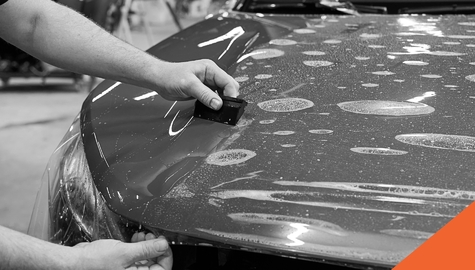Tips for Buying a New Car
Tuesday, 17 October 2023
Whether it be your first car or your fourth, there are several steps you should follow when looking for a new vehicle. Buying a car can be fun and exciting, especially if you find one you love at a great price. If you are in the process of looking for a new set of wheels but don’t know where to start, keep reading for some tips on how to purchase a car and save on car insurance.
Do your research
Like many things in life, doing a little bit of research will go a long way when buying a car. While you might have your eyes set on a specific car, you should always weigh out your options. Consider looking up different makes and models online to see if there are any others that you could see yourself driving. The options out there are endless, which makes it easier to find a car that is right for you.
Once you’ve narrowed down your search to a handful of cars, make note of their various features to determine which one is best suited for you. This includes their fuel economy, safety features, size, auto insurance rates, and price of the vehicle. Reading reviews on each car will also let you know how satisfied owners are with their purchase and if there are any common issues with said vehicle.
Get a pre-approved financing quote
Depending on its age and condition, buying your new car can be a big investment. If you require a lender to help pay for it, make sure you get pre-approved for a loan before you visit a dealership. There is a good chance that the interest rates you receive from your bank or an online lender are lower than what the dealership will offer if you finance through them.
Make sure you bring this quote with you to the dealership so that you can use it when negotiating with them. They will likely be able to work with you and might even offer a better rate. By getting pre-approved, you will also have a better understanding of what price is within your budget. This will vary from person to person and will depend on factors like your income, credit score, and any other debts you might be carrying.
Take your time
Learning how to buy a car can be a bit of a daunting process. While you may want to rush through to get it over with, taking your time is always recommended. Purchasing a car requires a lot of thought and consideration, so be diligent so that you won’t have any regrets or second thoughts after the car is in your possession.
In addition to dealerships, there are many people out there who have their cars listed on used car websites and mobile apps. Going through a private sale might lead to a little more work on your end, but it could also help you find a great deal and save you a lot of money. Cars are being listed for sale every day, so regardless of which route you go, make sure you regularly check to see if there are any that you are interested in.
Negotiate and don’t be afraid to walk away
When discussing the terms of your purchase, it is important to remain confident and firm on how much you want to pay for it. It’s always wise to establish a maximum spend that you are willing to commit to the vehicle. This will help when it comes time to negotiate the details of your purchase.
Before you head to the dealership or private seller, make sure you know the vehicle’s value and factors that can impact the value. If possible, you can also reference the prices of other vehicles that you have seen for sale. In some cases, the first offer you receive might be as low as the seller can go. At the end of the day, they need to make money from the sale, so if it doesn’t fit your situation, don’t be afraid to walk away and continue your search.
Know the value of your current vehicle
If you already own a vehicle, you might be planning to trade it in or sell it privately to help pay for your new car. If so, do your homework and find out the value of it online. Factors like the make and model, age, mileage, and overall condition will give you a rough estimate. Knowing how much it is worth will help prevent the dealer or buyer from valuing it less than they should.
Additionally, resist the temptation to spruce it up before trading it in. When you go into a dealership with the vehicle detailed, it makes it seem like you are prepared to buy a new vehicle that day. There is no need to fix minor things on the car before trading it in, as the dealership can probably fix it for a lot cheaper than you. Lastly, do not mention it to the dealer until the end of the buying process so that they don’t try to use this information against you when looking into the price of a new vehicle.
Always test drive
Perhaps one of the more important steps is test driving the car. This will give you a better insight into various aspects such as comfort, ergonomics, quality of materials, noise and vibration, acceleration and braking, handling and steering, practicality and space, and any unique features the car might have. If you have children who will be passengers daily, bring them as well, along with their car seats and any large items you carry frequently, to make sure everything fits.
Try out the air conditioning, turn signals, radio, and windshield wipers to make sure that everything functions properly. When you take the car out, drive it like you own it. Ask the dealer or current owner if you can take it on a route that you use regularly so that there are no surprises when you own it. This will be a big factor in determining if the car is right for you.
Know your budget
There are several factors that will play into the overall cost of your new car. The purchase price is just the first of many expenses you will need to cover in the years to come. The cost of fuel, maintenance, and car insurance are all key areas to focus on. They all widely differ depending on the type of vehicle you purchase. It’s vital to account for these when picking out your new car so that you don’t end up spending too much.
Consider your monthly expenses before you officially buy it to determine if the car fits into your budget. If possible, make a larger down payment so that your monthly payments on your loan can be as low as possible, or pay the entire amount upfront. Of course, make sure you leave yourself enough money so that you can still maintain the same standard of living.
If you are feeling confident and fully understand how to buy a car, contact a BIG broker so that you can secure the best coverage possible. Simply provide them with the details of the vehicle you are hoping to purchase, and they will shop for a car insurance quote that meets your needs. This way, you can hit the road worry-free, knowing that you and your new wheels are protected.



